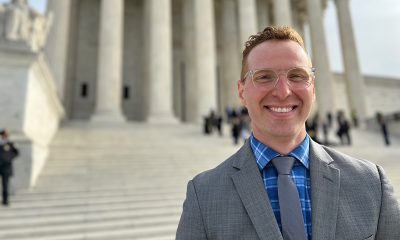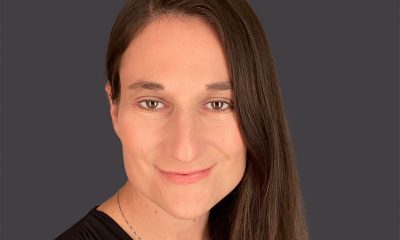National
Gay journalists to face union picket line
NLGJA declines to move annual convention
The National Lesbian & Gay Journalists Association has declined a request to withdraw its annual convention from San Francisco’s Hyatt Regency Hotel this weekend in connection with a labor union boycott of the hotel.
In a statement posted on its website, NLGJA officials said a cancellation of its contract with the hotel, which was signed three years ago, would result in a $150,000 penalty that could bankrupt the group.
The San Francisco chapter of Pride at Work, an LGBT labor group affiliated with the AFL-CIO, joined the city’s hotel workers union, Unite Here! Local 2, in calling on NLGJA to honor the union-initiated boycott of the Hyatt in an effort to win a long-delayed union contract for hotel employees.
“Although NLGJA understands the importance of collective bargaining and recognizes that worker actions are not to be blithely ignored, it is simply impossible at this late date for us to move this year’s convention to another hotel,” NLGJA President David Steinberg said in a statement.
“NLGJA was contacted by organizers from Unite Here! Local 2 in June, and we have had conversations with them for more than a month,” the statement says.
About 225 people were expected to attend the NLGJA convention, which was scheduled to take place at the Hyatt Regency in San Francisco’s Embarcadero waterfront district Sept. 2-5, according to NLGJA executive director Michael Tune.
Tune said the group knows of about 10 people who were scheduled to attend or speak at the convention and cancelled their attendance due to the union boycott.
“It’s been very positive,” he said. “I think most folks have understood it’s not an issue against NLGJA. This is something, of course, going on with the Hyatt. We happened to be having our convention here.”
NLGJA describes itself as the leading professional organization for LGBT journalists and an advocate for fair and accurate reporting on LGBT issues in the U.S. and abroad. Members of the organization include editors and reporters from some of the nation’s largest and most prominent news organizations, including the New York Times and broadcast news outlets as well as LGBT news organizations.
Although the hotel union has not called a strike against the San Francisco Hyatt, more than a month ago it scheduled a national, one-day protest against Hyatt hotels, including the San Francisco Hyatt, for Sept. 2. At the San Francisco Hyatt, union members and supporters were scheduled to form a picket line for the Sept. 2 action in support of the workers’ efforts to secure a union contract.
The picketing was set to take place on the opening day of the NLGJA convention, when the group was to hold its 7th Annual LGBT Media Summit for the gay press.
Gabriel Haaland, an official with the San Francisco chapter of Pride at Work, said representatives of the LGBT community were expected to participate in the picket and would urge people not to cross the picket line.
Haaland noted that a large number of LGBT groups and political leaders in San Francisco are supporting union boycotts of the Hyatt and other local hotels. Among them are gay city supervisors Tom Ammiano and Bevan Duffy and gay California State Senator Mark Leno. The city’s two leading LGBT political groups, the Harvey Milk Democratic Club and the Alice B. Toklas Democratic Club, are also supporting the boycott, according to literature released by the union.
According to Haaland, other organizations have cancelled contracts for conventions and meetings with San Francisco hotels targeted for union boycotts and have not been charged penalty fees such as the one NLGJA says it would face.
“I’ve seen groups break contracts with these hotels over boycotts before and they have never been charged a dime,” Haaland said. “More than one group has gone to the discomfort of moving their meetings because some of these folks are some of the lowest wage workers and, honestly, many of them are gay.”
Israel Alvaran, community outreach organizer for Unite Here! Local 2 and a member of Pride at Work said NLGJA would likely be faced with some added expenses for moving its convention to another hotel. But he said the union would have intervened to help NLGJA challenge a penalty fee from the Hyatt on grounds that the hotel most likely did not inform NLGJA of labor disputes and the possibility of a hotel boycott at the time the gay journalists group signed its contract with the hotel.
He noted that hotel labor disputes have been taking place in San Francisco for the past four years or longer.
“We’re disappointed that it never got to that point,” Alvaran said. “They never took the first step to look into moving the meeting.”
Although NLGA’s Steinberg and other members of the group’s board said they could not move the convention to another hotel, they urged attendees to consider reporting on the union’s grievances in their role as journalists.
“We can invite you to bring your notebooks, your recorders and your cameras to San Francisco and cover their action, along with the hotel’s response,” Steinberg said in a message posted on the NLGJA website.

The Comings & Goings column is about sharing the professional successes of our community. We want to recognize those landing new jobs, new clients for their business, joining boards of organizations and other achievements. Please share your successes with us at [email protected].
Congratulations to Gil Pontes III on his recent appointment to the Financial Advisory Board for the City of Wilton Manors, Fla. Upon being appointed he said, “I’m honored to join the Financial Advisory Board for the City of Wilton Manors at such an important moment for our community. In my role as Executive Director of the NextGen Chamber of Commerce, I spend much of my time focused on economic growth, fiscal sustainability, and the long-term competitiveness of emerging business leaders. I look forward to bringing that perspective to Wilton Manors — helping ensure responsible stewardship of public resources while supporting a vibrant, inclusive local economy.”
Pontes is a nonprofit executive with years of development, operations, budget, management, and strategic planning experience in 501(c)(3), 501(c)(4), and political organizations. Pontes is currently executive director of NextGen, Chamber of Commerce. NextGen Chamber’s mission is to “empower emerging business leaders by generating insights, encouraging engagement, and nurturing leadership development to shape the future economy.” Prior to that he served as managing director of The Nora Project, and director of development also at The Nora Project. He has held a number of other positions including Major Gifts Officer, Thundermist Health Center, and has worked in both real estate and banking including as Business Solutions Adviser, Ironwood Financial. For three years he was a Selectman, Town of Berkley, Mass. In that role, he managed HR and general governance for town government. There were 200+ staff and 6,500 constituents. He balanced a $20,000,000 budget annually, established an Economic Development Committee, and hired the first town administrator.
Pontes earned his bachelor’s degree in political science from the University of Massachusetts, Dartmouth.
Kansas
ACLU sues Kansas over law invalidating trans residents’ IDs
A new Kansas bill requires transgender residents to have their driver’s licenses reflect their sex assigned at birth, invalidating current licenses.

Transgender people across Kansas received letters in the mail on Wednesday demanding the immediate surrender of their driver’s licenses following passage of one of the harshest transgender bathroom bans in the nation. Now the American Civil Liberties Union is filing a lawsuit to block the ban and protect transgender residents from what advocates describe as “sweeping” and “punitive” consequences.
Independent journalist Erin Reed broke the story Wednesday after lawmakers approved House Substitute for Senate Bill 244. In her reporting, Reed included a photo of the letter sent to transgender Kansans, requiring them to obtain a driver’s license that reflects their sex assigned at birth rather than the gender with which they identify.
According to the reporting, transgender Kansans must surrender their driver’s licenses and that their current credentials — regardless of expiration date — will be considered invalid upon the law’s publication. The move effectively nullifies previously issued identification documents, creating immediate uncertainty for those impacted.
House Substitute for Senate Bill 244 also stipulates that any transgender person caught driving without a valid license could face a class B misdemeanor, punishable by up to six months in jail and a $1,000 fine. That potential penalty adds a criminal dimension to what began as an administrative action. It also compounds the legal risks for transgender Kansans, as the state already requires county jails to house inmates according to sex assigned at birth — a policy that advocates say can place transgender detainees at heightened risk.
Beyond identification issues, SB 244 not only bans transgender people from using restrooms that match their gender identity in government buildings — including libraries, courthouses, state parks, hospitals, and interstate rest stops — with the possibility for criminal penalties, but also allows for what critics have described as a “bathroom bounty hunter” provision. The measure permits anyone who encounters a transgender person in a restroom — including potentially in private businesses — to sue them for large sums of money, dramatically expanding the scope of enforcement beyond government authorities.
The lawsuit challenging SB 244 was filed today in the District Court of Douglas County on behalf of anonymous plaintiffs Daniel Doe and Matthew Moe by the American Civil Liberties Union, the ACLU of Kansas, and Ballard Spahr LLP. The complaint argues that SB 244 violates the Kansas Constitution’s protections for personal autonomy, privacy, equality under the law, due process, and freedom of speech.
Additionally, the American Civil Liberties Union filed a temporary restraining order on behalf of the anonymous plaintiffs, arguing that the order — followed by a temporary injunction — is necessary to prevent the “irreparable harm” that would result from SB 244.
State Rep. Abi Boatman, a Wichita Democrat and the only transgender member of the Kansas Legislature, told the Kansas City Star on Wednesday that “persecution is the point.”
“This legislation is a direct attack on the dignity and humanity of transgender Kansans,” said Monica Bennett, legal director of the ACLU of Kansas. “It undermines our state’s strong constitutional protections against government overreach and persecution.”
“SB 244 is a cruel and craven threat to public safety all in the name of fostering fear, division, and paranoia,” said Harper Seldin, senior staff attorney for the ACLU’s LGBTQ & HIV Rights Project. “The invalidation of state-issued IDs threatens to out transgender people against their will every time they apply for a job, rent an apartment, or interact with police. Taken as a whole, SB 244 is a transparent attempt to deny transgender people autonomy over their own identities and push them out of public life altogether.”
“SB 244 presents a state-sanctioned attack on transgender people aimed at silencing, dehumanizing, and alienating Kansans whose gender identity does not conform to the state legislature’s preferences,” said Heather St. Clair, a Ballard Spahr litigator working on the case. “Ballard Spahr is committed to standing with the ACLU and the plaintiffs in fighting on behalf of transgender Kansans for a remedy against the injustices presented by SB 244, and is dedicated to protecting the constitutional rights jeopardized by this new law.”
National
After layoffs at Advocate, parent company acquires ‘Them’ from Conde Nast
Top editorial staff let go last week

Former staff members at the Advocate and Out magazines revealed that parent company Equalpride laid off a number of employees late last week.
Those let go included Advocate editor-in-chief Alex Cooper, Pride.com editor-in-chief Rachel Shatto, brand partnerships manager Erin Manley, community editor Marie-Adélina de la Ferriére, and Out magazine staff writers Moises Mendez and Bernardo Sim, according to a report in Hollywood Reporter.
Cooper, who joined the company in 2021, posted to social media that, “Few people have had the privilege of leading this legendary LGBTQ+ news outlet, and I’m deeply honored to have been one of them. To my team: thank you for the last four years. You’ve been the best. For those also affected today, please let me know how I can support you.”
The Advocate’s PR firm when reached by the Blade said it no longer represents the company. Emails to the Advocate went unanswered.
Equalpride on Friday announced it acquired “Them,” a digital LGBTQ outlet founded in 2017 by Conde Nast.
“Equalpride exists to elevate, celebrate and protect LGBTQ+ storytelling at scale,” Equalpride CEO Mark Berryhill said according to Hollywood Reporter. “By combining the strengths of our brands with this respected digital platform, we’re creating a unified ecosystem that delivers even more impact for our audiences, advertisers, and community partners.”
It’s not clear if “Them” staff would take over editorial responsibilities for the Advocate and Out.




















